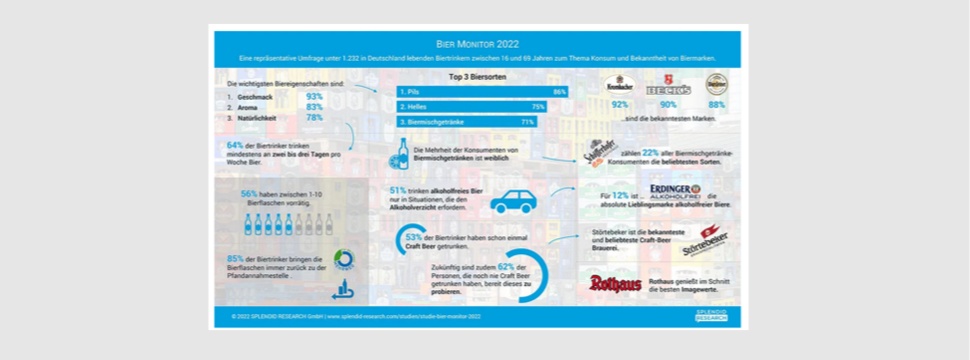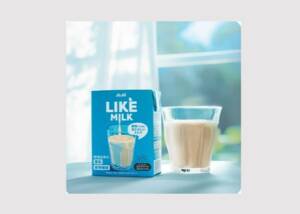Study: Beer Monitor 2022
News General news
According to a recent representative study, most Germans resort to conventional types of beer. Furthermore, the study provides a deep insight into the consumption habits of the beer nation Germany.

As part of a representative survey, the market research institute SPLENDID RESEARCH asked 1,232 beer drinkers between the ages of 16 and 69 living in Germany about the topic of beer online via its panel at www.befragmich.de. The study provides information on general attitudes as well as drinking and purchasing behavior. The study provides information on general attitudes as well as drinking and purchasing behavior. In addition, brand indicators were determined for a total of 161 beer brands. This study is a follow-up to Beer Monitor 2020, and the comparison of the two studies allows conclusions to be drawn about changes during the Corona pandemic.
Beer remains a cultural asset
The results of the study show: Germany's beer drinkers still have a rather traditional attitude. The majority agree that beer is a cultural asset that must be brewed in accordance with the Purity Law. Taste, aroma and naturalness are decisive characteristics for over three quarters of beer drinkers. Creativity, exclusivity or exotic flavors, on the other hand, play only a subordinate role for the broad masses.
Pilsner is the most popular type of beer
64 percent of all beer consumers drink beer on at least two days a week. The most popular beer is the classic Pilsner - 86 percent drink the bottom-fermented brew at least occasionally. It is followed by Helles (75 percent) and mixed beer drinks (71 percent). Compared with Beer Monitor 2020, it is noticeable that pale beer has overtaken mixed beer beverages and non-alcoholic beer. The acceptance of mixed beer varieties is significantly higher among the women surveyed (40 percent) than among men (22 percent).
Fifty-six percent of respondents say they stock between one and ten bottles of beer. In terms of Germany's population, that's quite a lot - it's a good thing that, according to their own statements, 85 percent of beer drinkers take their empty bottles to a deposit collection point.
Krombacher is the best-known beer brand
Germany's beer market is still characterized by a seemingly unlimited number of different beer brands and a wide range of varieties. Despite this diversity, the market is dominated not only by many smaller and often only regionally represented beer brands, but also by a number of large brewery groups, some of which also operate internationally. The best-known brands in Germany are Krombacher (92 percent), Becks (90 percent) and Warsteiner (88 percent). Corona Extra (71 percent) gained 16 percentage points in awareness over the past two years (2020: 55 percent).
Majority of Germans open to craft beer
Fifty-three percent of respondents said they had already tried one of the mostly craft beer varieties, an increase of 10 percentage points. Among those respondents who have never had craft beer, 62 percent think future consumption is possible.
"Craft beer has again increased in awareness compared to 2020. It is likely that this number will continue to rise in the future. Corona Extra can be considered another winner of the pandemic," said Norman Habenicht, Head of Marketing & Communications at SPLENDID RESEARCH.










